初中英语时态之一般将来时
初中英语《一般将来时》轻松掌握英语时态
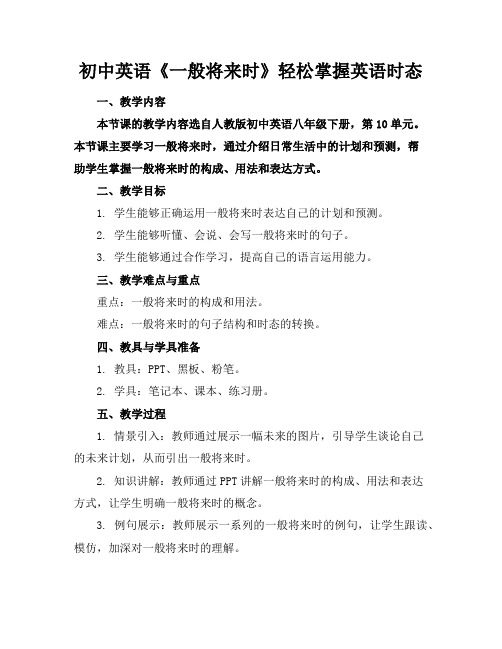
初中英语《一般将来时》轻松掌握英语时态一、教学内容本节课的教学内容选自人教版初中英语八年级下册,第10单元。
本节课主要学习一般将来时,通过介绍日常生活中的计划和预测,帮助学生掌握一般将来时的构成、用法和表达方式。
二、教学目标1. 学生能够正确运用一般将来时表达自己的计划和预测。
2. 学生能够听懂、会说、会写一般将来时的句子。
3. 学生能够通过合作学习,提高自己的语言运用能力。
三、教学难点与重点重点:一般将来时的构成和用法。
难点:一般将来时的句子结构和时态的转换。
四、教具与学具准备1. 教具:PPT、黑板、粉笔。
2. 学具:笔记本、课本、练习册。
五、教学过程1. 情景引入:教师通过展示一幅未来的图片,引导学生谈论自己的未来计划,从而引出一般将来时。
2. 知识讲解:教师通过PPT讲解一般将来时的构成、用法和表达方式,让学生明确一般将来时的概念。
3. 例句展示:教师展示一系列的一般将来时的例句,让学生跟读、模仿,加深对一般将来时的理解。
4. 练习巩固:教师设计一些练习题,让学生运用一般将来时进行回答,检验学生对知识的掌握程度。
5. 小组活动:学生分组进行讨论,用一般将来时制定一个共同的计划,并展示给全班同学。
7. 作业布置:教师布置一些有关一般将来时的作业,让学生课后巩固所学知识。
六、板书设计一般将来时构成:will + 动词原形用法:表示将来会发生的事情或打算、计划做的事情例句:I will go to the library.七、作业设计1. 请用一般将来时写一篇关于你未来计划的短文。
(1)What will you do after class?答案:I will go home and do my homework.(2)What will you have for dinner?答案:I will have rice and vegetables.八、课后反思及拓展延伸本节课通过引入日常生活中的计划和预测,使学生能够更好地理解和运用一般将来时。
初中一般将来时讲解
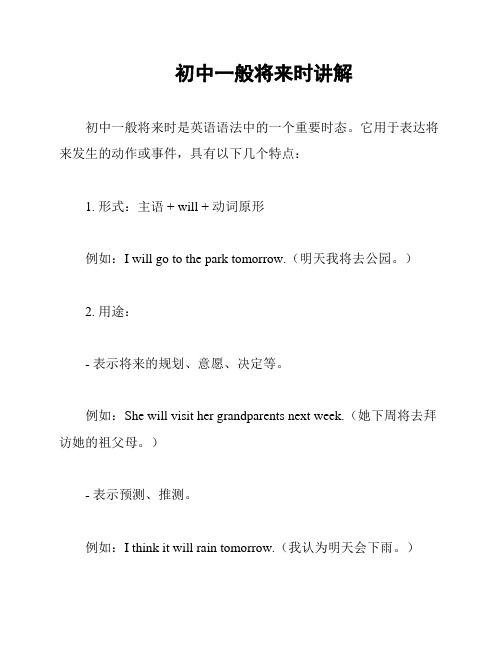
初中一般将来时讲解初中一般将来时是英语语法中的一个重要时态。
它用于表达将来发生的动作或事件,具有以下几个特点:1. 形式:主语 + will + 动词原形例如:I will go to the park tomorrow.(明天我将去公园。
)2. 用途:- 表示将来的规划、意愿、决定等。
例如:She will visit her grandparents next week.(她下周将去拜访她的祖父母。
)- 表示预测、推测。
例如:I think it will rain tomorrow.(我认为明天会下雨。
)- 用于官方通知、邀请、警告等场合。
例如:The school will hold a party next month.(学校下个月将举办一次聚会。
)- 用于做出决定或提供帮助。
例如:I will help you with your homework.(我将帮助你完成作业。
)3. 注意事项:- 表示将来的时间状语词一般使用,如tomorrow(明天)、next week(下周)等。
- 一般将来时常与表示将来的时间状语词或时间状语从句一起使用。
- 对于第一人称(I)和第二人称(you)的陈述句,可以使用缩略形式:I'll, you'll。
4. 示例:- She will go to the cinema this evening.- They will have a picnic in the park.- We will study Spanish next semester.- He will go on vacation next month.总之,初中一般将来时是英语语法中的重要时态,可以表达将来发生的动作或事件,同时也可以用于表示意愿、决定、预测等场合。
掌握这一时态的用法有助于学生加深对英语语法的理解。
初中英语知识点归纳一般将来时的用法
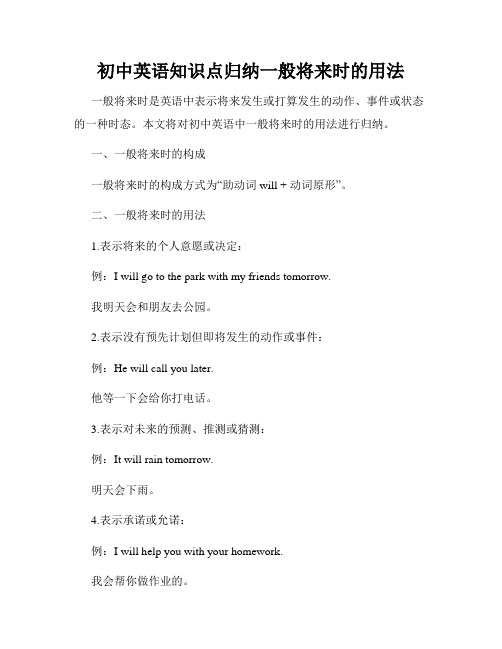
初中英语知识点归纳一般将来时的用法一般将来时是英语中表示将来发生或打算发生的动作、事件或状态的一种时态。
本文将对初中英语中一般将来时的用法进行归纳。
一、一般将来时的构成一般将来时的构成方式为“助动词 will + 动词原形”。
二、一般将来时的用法1.表示将来的个人意愿或决定:例:I will go to the park with my friends tomorrow.我明天会和朋友去公园。
2.表示没有预先计划但即将发生的动作或事件:例:He will call you later.他等一下会给你打电话。
3.表示对未来的预测、推测或猜测:例:It will rain tomorrow.明天会下雨。
4.表示承诺或允诺:例:I will help you with your homework.我会帮你做作业的。
5.表示对现在情况的预测或推测:例:She will be here soon.她马上就会到这里。
6.表示征求意见或征询意见:例:Will you come to the party tomorrow?明天你会来参加派对吗?7.表示习惯性或经常性的动作:例:He will often go swimming on weekends.他经常在周末去游泳。
三、一般将来时的否定与疑问句1.否定句构成:在will后面加not。
例:He will not come to the meeting tomorrow.他明天不会来开会。
2.疑问句构成:将助动词will提到句子的主语前面。
例:Will you pass me the salt, please?请你把盐递给我好吗?四、一般将来时的时间状语一般将来时可以与一些表示将来时间的时间状语连用,如:tomorrow,next week,in the future等。
例:I will visit my grandparents next week.我下周会去拜访我的祖父母。
英语时态之一般将来时

I am going to stay at home tomorrow. He is going to be a writer next year .
Be动词原形
be
be going to的否定句型结构
主语+be not going to+动词原形 am, is, are
Mary isn’t going to watch a movie.
never done before.
一般将来时content
一般将来时概念
表示将要发生的动作 或者将要存在的状态。
一般将来时标志词
tomorrow next day next week next month next year next weekend
this afternoon this evening
this weekend soon the day after tomorrow before long不久
tomorrow morning tomorrow afternoon tomorrow evening in two days 在两天之内 in one week在一周之内
be going to的一般将来时
3.你的妈妈计划下午见她的朋友吗?
Is your mom going to meet her friend this afternoon?
4.他们计划明天去骑马吗?
Are they going to ride horses tomorrow?
5.你妈妈今天Leabharlann 上做中国菜吗.Is your mother going to cook Chinese food this evening?
翻译句子
初一年级英语英语一般将来时知识点及解析
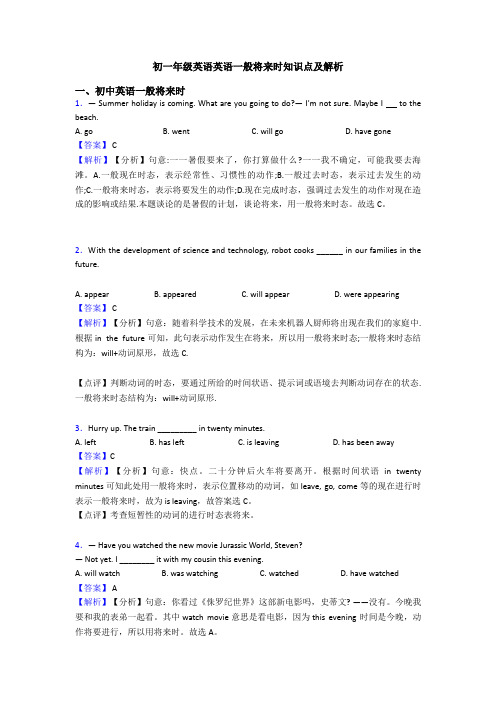
初一年级英语英语一般将来时知识点及解析一、初中英语一般将来时1.— Summer holiday is coming. What are you going to do?— I'm not sure. Maybe I to the beach.A. goB. wentC. will goD. have gone【答案】 C【解析】【分析】句意:一一暑假要来了,你打算做什么?一一我不确定,可能我要去海滩。
A.一般现在时态,表示经常性、习惯性的动作;B.一般过去时态,表示过去发生的动作;C.一般将来时态,表示将要发生的动作;D.现在完成时态,强调过去发生的动作对现在造成的影响或结果.本题谈论的是暑假的计划,谈论将来,用一般将来时态。
故选C。
2.With the development of science and technology, robot cooks ______ in our families in the future.A. appearB. appearedC. will appearD. were appearing【答案】 C【解析】【分析】句意:随着科学技术的发展,在未来机器人厨师将出现在我们的家庭中. 根据in the future可知,此句表示动作发生在将来,所以用一般将来时态;一般将来时态结构为:will+动词原形,故选C.【点评】判断动词的时态,要通过所给的时间状语、提示词或语境去判断动词存在的状态. 一般将来时态结构为:will+动词原形.3.Hurry up. The train _________ in twenty minutes.A. leftB. has leftC. is leavingD. has been away【答案】C【解析】【分析】句意:快点。
二十分钟后火车将要离开。
根据时间状语in twenty minutes可知此处用一般将来时,表示位置移动的动词,如leave, go, come等的现在进行时表示一般将来时,故为is leaving,故答案选C。
初中英语一般将来时结构形式的时态知识点
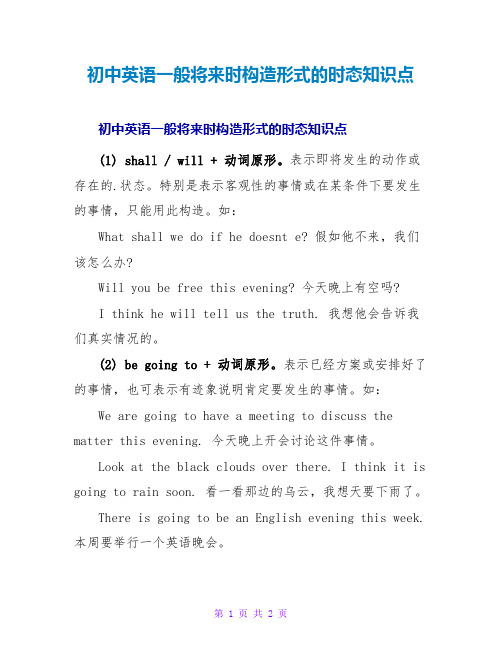
初中英语一般将来时构造形式的时态知识点初中英语一般将来时构造形式的时态知识点(1) shall / will + 动词原形。
表示即将发生的动作或存在的.状态。
特别是表示客观性的事情或在某条件下要发生的事情,只能用此构造。
如:What shall we do if he doesnt e? 假如他不来,我们该怎么办?Will you be free this evening? 今天晚上有空吗?I think he will tell us the truth. 我想他会告诉我们真实情况的。
(2) be going to + 动词原形。
表示已经方案或安排好了的事情,也可表示有迹象说明肯定要发生的事情。
如:We are going to have a meeting to discuss the matter this evening. 今天晚上开会讨论这件事情。
Look at the black clouds over there. I think it is going to rain soon. 看一看那边的乌云,我想天要下雨了。
There is going to be an English evening this week. 本周要举行一个英语晚会。
(3) be to + 动词原形。
表示一种常规性的活动或注定要做的事情。
如:Who is to clean the classroom today? 今天该谁清扫教室了?When are you to return your library book? 你什么时候要还图书?(4) be about to + 动词原形。
表示就要做或正好要做的事情。
往往暗含一种时间上的巧合,因此,句子不能再用时间状语。
如:。
中考英语备考:初中英语主要时态系列讲座(三)----一般将来时与过去将来时精讲及练习(含答
中考初中英语主要时态系列讲座(三)----一般将来时与过去将来时精讲及练习(含答案)中考初中英语主要时态系列讲座(二)----一般将来时与过去将来时精讲及练习考点一:动词一般将来时的用法一般将来时,有两层含义:其一,表示将要发生的动作或存在的状态;其二,表示打算、计划或准备要做的某事。
为了直观地掌握一般将来时的用法,下面我们用表格的形式来表达。
表(一)一般将来时的表示类型及主要句式表(三)一般将来时的主要用法(天津)---What is your plan for next weekend,Lingling?----I volunteer work in the museum.A. was doingB. didC. have doneD. am going to do【析】正确答案D。
句意是:玲玲,下周末的安排是什么?我打算到博物馆去作志愿者。
根据上文的next weekend(下周末)可知,玲玲的回答是指下周的打算,所以用一般将来时,因此,正确答案为D。
【典型考例】(四川内江)---Have you watched the new movie,Joe?---No,I________ it with my sister this evening.A.watch B.are watching C.watched D.will watch【析】正确答案:D。
句意是:乔,你看了这部新电影吗?没有。
我今晚将和我妹妹一起去看。
根据本句末的时间状语this evening可知,看新电影这动作是将来要做的事情,因此动词使用一般将来时。
所以,正确答案为D。
【典型考例】(天津)----Could you tell me for the fruit?----By paying over the Internet.A. how much will I payB. how much I will payC. how will I payD. how I will pay【析】正确答案D。
英语时态一般将来时
(二)“be going to+动原” 与“现在进行时”
be going to主要表示主观想法或意图, 而现在进行进表示将来强调作出的安排。
比较:
I’m going to wash the car if I have time.
I’m picking you up at 6; don’t forget.
(三)一般将来时的句式转换
1.否定 2.疑问 a.一般疑问
b.特殊疑问
(一) “will / shall+动词原形”
“be going to +动词原形” @1 一般可互换; @2
经过事先考虑好的,则通常要用be going to 说话的当时才临时想到的,则通常用will。
@3
若是有迹象表明要发生某事,通常 只用be going to。
@5一般现在表将来
1.按规定要发生的事或表示事实;
The train leaves at 7:25 this evening. Tomorrow is Wednesday.表将来;
1.There ____ a concert on People Square next Monday evening.
@1(be to) @2(be about to) @3(be due to)
三者均表示计划或打算即将要发生的 动作;
但@2一般的用法是表客观即将发生 之事,否定句中才表主语的计划性。
@4现在进行时表将来
现在进行时表将来的动作,谓语 通常为瞬间动词。如: come, go, arrive, leave start, return, stay, meet, get 等。
(二)一般将来时的构成
a.一般将来时的基本构成
@1 will/shall + 动词原形
【初中英语】常见一般将来时最全总结
【初中英语】常见一般将来时最全总结一、初中英语一般将来时1.—How many children do most post-80s families have?—One. They ______ two in the future, I guess.A. will haveB. hadC. haveD. have had【答案】A【解析】【分析】句意:——大部分80后的家庭有几个孩子?——一个。
我猜想将来他们会有两个的。
A.will have将会有;B为have的原形;C为have的过去完成时。
根据回答中“in the future”在将来,可知应选将来时。
一般将来时的两种结构:will+动词原形或be going to do,故选A。
【点评】考查时态一般将来时,注意一般将来时的状语提示,如tomorrow,next year ,in the future等。
2.Michael _________ in a school in Yunnan from February to June next year.A. teachB. taughtC. will teachD. was teaching【答案】C【解析】【分析】句意:Michael将会在明年2月到6月在云南的学校教学。
A动词原形;B一般过去时;C是一般将来时;D是过去进行时。
Next year是一般将来时的时间状语,will+动词原形,故答案为C。
【点评】考查动词的时态,注意句中的时间状语。
3.— There ________a football match on TV tonight. I can't wait to watch it.— Me, too. It's ________ Guangzhou Evergrande and the Australian team Melbourne Victory.A. will be; betweenB. will be; bothC. will have; betweenD. will have; both【答案】A【解析】【分析】句意为:---今晚将有一场电视直播足球比赛,我非常想看。
初中__英语语法__一般将来时态
2.看来就要发生的事(预计要发 生或不可避免要发生的事): It’s going to snow tonight. 预计今晚要下雪了
பைடு நூலகம்
特殊用法:现在进行时表示将来
1. 表示未来的安排和计划: We are having a party next week. 我们计划下周举行一个派对 2.有时表示即将发生的动作: I’m leaving.我要走了。
will可缩写为:'ll,如:
I will= I'll; she will = she’ll;will not 可以缩写为 won't 。
与一般将来时连用的时间状语
tomorrow 明天 this year 今年
the day after tomorrow 后天
soon 很快 in three days 三天后
肯定回答是:Yes, I will. 否定回答是:No, I will not (won't).
一般将来时的句子变成特殊疑问句的时候,通 常结构是:特殊疑问词+一般疑问句的语序 I will leave for Beijing next week. 这句话可转换特殊疑问句: Who will leave for Beijing next week? (对主语提问) When will you leave for Beijing? (对时间提问)
一般将来时
含义:表示将来发生的动作或 状态。 基本结构:will +动词原形 there will be be going to
例如:
People will have robots in their home. 人们的家中将会有机器人。 There will be one country in the world. 世界上将会只有一个国家。
- 1、下载文档前请自行甄别文档内容的完整性,平台不提供额外的编辑、内容补充、找答案等附加服务。
- 2、"仅部分预览"的文档,不可在线预览部分如存在完整性等问题,可反馈申请退款(可完整预览的文档不适用该条件!)。
- 3、如文档侵犯您的权益,请联系客服反馈,我们会尽快为您处理(人工客服工作时间:9:00-18:30)。
1.要在将来的某个时间内发生,是“纯粹的将来动作”。 eg I shall / will not be free tomorrow. 2.表说话人的意图、打算或某种可能性 eg Who is going to speak first? 3.按计划要发生的动作或命令他人做某事 eg The new bridge is to open to traffic in 3 days.、
一般将来时结构 常见结构 1)shall / will + 动词原形这种表示方法是说,动作在现在或目前还未发生,要在将来的某个时间内发生;它没有主观性,是“纯粹的将来动作”。will用于各种人称; shall只用于第一人称可表征求意见。例如:
I shall / will not be free tomorrow .我明天没空。 He will arrive here this evening .他今晚抵达这里。
2) be( am / is / are ) + going +不定式 这种表示方法主要是说明 A)“说话人的意图、打算”;B)“某种可能性”。例如: A) He is going to spend his holidays in London . 他打算在伦敦度假。 Who is going to speak first? 谁先发言? B) It is going to rain soon .马上要下雨了。 Is he going to collect any data for us? 他会帮我们收集资料吗? If you go to New Zealand, you are going to like the place. 如果你去新西兰,你会喜欢上那个地方的。 3) be( am / is / are ) + 不定式 表示方法描述两钟情况: 按计划安排要发生的动作,这个动作发生的时间一般不会很远; 要求或命令他人做某事。例如: A) The new bridge is to open to traffic in three days. 新桥三天后通车。 The factory is to go into production before National Day. 这家工厂国庆节前投产。 B) You are not to bring any mobile communication means into the exam-room . 任何移动通讯工具都不得带入考场。 You are to stay home until your mother comes back. 你妈回来之前你不要出去。 4) 用一般现在时或现在进行时(限于某些动词)表示按计划安排要发生的事。主要强调“按计划安排要发生的事”。例如: Do you get off at the next stop? 你下一站下车吗? The plane takes off at 11:00 . 那架飞机上午十一点起飞。 Mr. Reider is leaving for New York next week. 里德先生下周动身去纽约。 一般将来时基本句型
肯定句:I/We shall/will go. You/He/She/They Will go. 否定句:I/We shall/will not go. You/He/She/They Will not go. 疑问句:Shall I/we go? Will you/he/she/they go? 简略回答:(肯)Yes,主语 shall/will (否) No,主语 shall/will not 特殊疑问句:一般将来时的特殊疑问句是将疑问词放在句首,后接一般疑问句(就主语提问时,以疑问词who开头的疑问词除外) ----- why will you be here on Sunday? -----I will have a meeting on Sunday(对特殊疑问句要进行具体回答) 练习: 一、单项选择 ( ) 1. There __________ a meeting tomorrow afternoon. A. will be going to B. will going to be C. is going to be D. will go to be ( ) 2. Charlie ________ here next month. A. isn't working B. doesn't working C. isn't going to working D. won't work ( ) 3. He ________ very busy this week, he ________ free next week. A. will be; is B. is; is C. will be; will be D. is; will be ( ) 4. There ________ a dolphin show in the zoo tomorrow evening. A. was B. is going to have C. will have D. is going to be ( ) 5. -_____ you ______ free tomorrow? - No. I _____ free the day after tomorrow. A. Are; going to; will B. Are; going to be; will C. Are; going to; will be D. Are; going to be; will be ( ) 6. Mother ________ me a nice present on my next birthday. A. will gives B. will give C. gives D. give ( ) 7. - Shall I buy a cup of tea for you? -________. (不,不要。) A. No, you won't. B. No, you aren't. C. No, please don't. D. No, please. ( ) 8. - Where is the morning paper? - I ________ if for you at once. A. get B. am getting C. to get D. will get ( ) 9. ________ a concert next Saturday? A. There will be B. Will there be C. There can be D. There are ( ) 10. If they come, we ________ a meeting. A. have B. will have C. had D. would have ( ) 11. He ________ her a beautiful hat on her next birthday. A. gives B. gave C. will giving D. is going to giving ( ) 12. He ________ to us as soon as he gets there. A. writes B. has written C. will write D. wrote ( ) 13. He ________ in three days. A. coming back B. came back C. will come back D. is going to coming back ( ) 14. If it ________ tomorrow, we'll go roller-skating. A. isn't rain B. won't rain C. doesn't rain D. doesn't fine ( ) 15. - Will his parents go to see the Terra Cotta Warriors tomorrow? - No, ________ (不去). A. they willn't. B. they won't. C. they aren't. D. they don't. ( ) 16. Who ________ we ________ swimming with tomorrow afternoon? A. will; go B. do; go C. will; going D. shall; go ( ) 17. We ________ the work this way next time. A. do B. will do C. going to do D. will doing ( ) 18. Tomorrow he ___ a kite in the open air first, and then ____ boating in the park. A. will fly; will go B. will fly; goes C. is going to fly; will goes D. flies; will go ( ) 19. The day after tomorrow they ________ a volleyball match.
